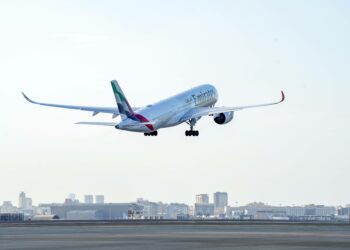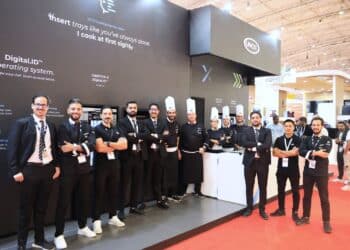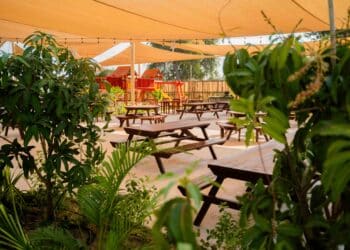
F&B leaders, professionals and chefs came together for Hotel & Catering News Middle East’s roundtable, held ahead of The Big F&B Forum, to discuss some of the most important topics in the industry at Rixos, The Palm.
In attendance were Yousef Al-Barqawi, regional manager, Deliveroo Editions – EMEA, H. Peter Drescher, vice president, Food & Beverage MEA at Accor, Duncan Fraser-Smith, vice president, TFG Food and Beverage at The First Group, Chef Mariangela Ruggiero, executive chef at Radisson Blu Media City, Abdul Kader Saadi, managing director at Glee Hospitality, Chef Dragan Susa, chef de cuisine at Emerald Palace Kempinski Dubai, Dries Vande Velde, head of Marketing & PR at Creneau International & SWR Hospitality and Najib Yaacoub, regional brand manager at Black Tap (managed by Sunset Hospitality).
When it comes to F&B, how can a balance be achieved between quality and speed, without compromising on one or the other? How can a smooth flow of operations be ensured, as well as optimum service for guests?
Al-Barqawi: Customers in general care about service, selection and price. More often than not, one comes at the cost of the other. The Dubai customer is discerning, and while they don’t mind paying a bit more for the right offering, they still seek value for money in every experience.
Drescher: While there’s a market now for everyone, I prefer quality over speed – style, elegance and quiet eating, but others who prefer fast food will go to venues that offer that, and you’ll see a shift in diners’ behavioural patterns accordingly.

Fraser-Smith: Quick delivery is what people are expecting these days, but the cost of this is that you’re losing out on overall experience. The delivery model has deflated expectations, killing other factors. I would like to see focus on quality, authenticity and relevance rather than just speed.
Ruggiero: We’re a business hotel, so our focus is on lunch and dinner – the former needing to be served fast. We should always be ready, yet never compromise on quality as repeat guests come in every day. As for dinner, it will always be important to enjoy the experience.
Saadi: The industry is split into two aspects, dining and delivery. For the former, people still do come in to enjoy the experience, music and ambience, while the latter is all about speed and price point – which is hurting the experience aspect.
Susa: Depending on where customers are coming from, they expect different things. Industry professionals often forget that we have different nationalities coming into our establishments, and we need to cater to each and every one’s rhythm.
Vande Velde: At the core of running a hospitality business is maintaining quality and speed. Dubai is a demanding market, and you need both.
Yaacoub: Customers in the region, and specifically in Dubai, know what they want – and they expect experience more than speed. At Black Tap, we offer the graffiti, music, fit outs and the most important thing – the good people. We always have aces in places, we don’t rush things and guests enjoy the quality service and overall experience.

How can the industry keep up with the rise of different consumer preferences, including plant-based eating, while maintaining revenue streams and ensuring sustainability?
Al Barqawi: It’s definitely not a trend, plant-based eating is here to stay. However, if you try to please everybody, you’ll please no one. Find your niche, those are your customers. Diners today know a lot more about food, so they feel more entitled to ask for certain requests, and that warrants a direction from restaurants which should stick to what they do best – what got them there in the first place.
Drescher: Our industry is driven by trends, starting from back when it was all about gluten-free, all the way to veganism. This lifestyle is an addition to what we do, not to mention – meat production is harmful for the environment. We need to adapt to the market and these customers’ strong beliefs – as opposed to us hoteliers often trying to dictate what people like, which is wrong.
Fraser-Smith: Veganism is a way of life, not a trend, and it’s not going anywhere. This isn’t the Keto or Atkins diet. That’s why restaurateurs and operators need to cater to this. Even though we’re a smokehouse, our chef has now started smoking vegetables and different foods, so we can come up with more options. We can be quite reactive, and what we need is to be pioneers. We should be educating consumers and the community and can’t close ourselves off to a market segment that’s continually growing.
Ruggiero: From the kitchen perspective, we can’t lose our identity. Restaurant staff always need to explain things to guests in terms of what we can and can’t do as much as possible, and reach an agreement in the end through which we can make them happy.
Saadi: Once you open a restaurant, you must have done your research beforehand – you must believe in in what you’re offering. While you can’t impose anything on the customer, you also can’t change your menu as it will mess up both the brand and operations, in addition to the revenue stream. I’m sure introducing a vegan menu in a non-vegan restaurant isn’t the way forward.

Susa: We’ve spoiled customers in Dubai. In Europe, you go to certain restaurants for certain reasons. I believe that plant-based eating is more of a trend, but I do also believe that we need to monitor our suppliers for any harmful practices. If we keep adapting, the concept will eventually change – which isn’t something we would want.
Vande Velde: In Dubai, we have a lot of demand to change certain dishes. The consumer is very spoiled here, yet I do believe that venues should always try to adapt to the market. However, always stay true to your brand values and pillars.
Yaacoub: Veganism is on the rise, it’s a lifestyle. Vegans can also certainly enjoy at Black Tap. We have three to four recipes now which are purely vegan, even though it’s even more costly to get the buns, for example, even more so than with all-American burgers. We’re even developing a vegan crazy shake!



































































